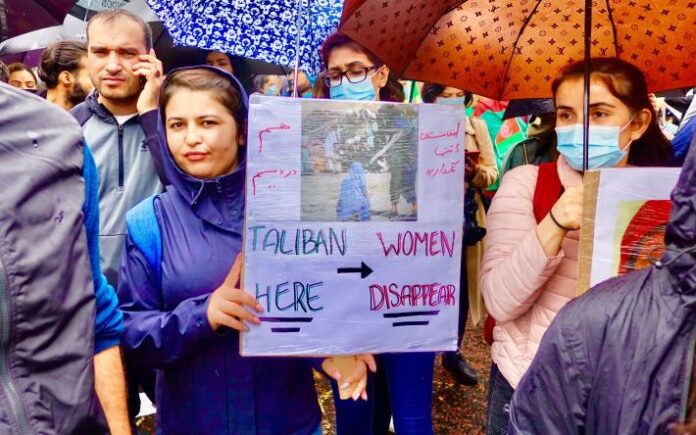Many of the 663 Afghan human rights defenders surveyed have endured violence, kidnapping, and psychological harm, with women encountering more acute abuses.
According to a survey conducted by the Afghanistan Human Rights Coordination Mechanism (AHRCM), a consortium facilitated by Freedom House, in partnership with the Afghan Canadian Civil Society Forum, human rights defenders in Afghanistan and those who have fled the country continue to face threats such as arbitrary arrest, kidnapping, torture, imprisonment, and violence against family members (ACSF).
“The people of Afghanistan are experiencing a new level of lawlessness, as arbitrary arrests and extrajudicial killings have become a defining feature of Taliban rule,” said Michael J. Abramowitz, president of Freedom House. “Afghan human rights defenders live in fear and face grave challenges, whether they remain in the country or have fled abroad. The international community must redouble its support for these activists’ tireless efforts to create a freer and more just Afghanistan.”
The survey is part of a larger report, A Needs Assessment of Afghan Human Rights Defenders, which finds that 90 percent of Afghan human rights defenders in Afghanistan have been subjected to violence or threats under the Taliban’s repressive rule. The survey of 663 Afghan human rights defenders was conducted between May and June 2022 and offers one of the clearest pictures to date of the dire conditions endured by human rights defenders in the aftermath of the August 2021 collapse of Afghanistan’s elected government. Before the Taliban retook control of Afghanistan, the country was home to numerous groups and individuals who advocated for the rights and protection of all Afghans, including women, religious minorities, and marginalized communities. These human rights defenders have been under assault since the Taliban returned to power, raising deep concern about the long-term protection of civil liberties and political rights in Afghanistan.
“Human rights defenders need protection wherever they are,” said Anne C. Richard, Afghanistan coordination lead and distinguished fellow at Freedom House. “The immense risks faced by human rights defenders underscore the importance of upholding the right to seek asylum, including by strengthening refugee resettlement programs and not relying on temporary forms of relocation in unsafe countries for human rights defenders under threat. The international community—including the UN, regional and global donors, and the governments of countries hosting refugees—should do everything in its power to assist these brave champions of democratic values.”
Survey respondents in Afghanistan indicated that they and other human rights defenders face significant challenges, including intimidation and harassment (46.8 percent); threats to their life and physical safety (24.1 percent); arbitrary arrest and torture (16.4 percent); defamation and house searches (4.4 percent); violence against family members (3.8 percent); other physical and psychological harm (3.5 percent); and kidnapping and imprisonment (0.8 percent).
Like their in-country counterparts, human rights defenders who have fled the country identified a number of risks they still face, including psychological harm (45.4 percent); harassment by police and forced deportation (33.7 percent); lack of financing for themselves and their families (9.9 percent); other forms of harassment (7.2 percent); and security threats (3.6).
In tandem with the Taliban’s harsh gender-based restrictions on education, employment, and free movement, women human rights defenders have been denied access to public and political processes and systematically deprived of their other human rights. Both inside and outside Afghanistan, women survey respondents reported experiencing security, social, and economic threats. The report finds that women are particularly vulnerable to allegations of prostitution or immorality, which are punishable by whipping or death by stoning under the Taliban. Women human rights defenders have also received sexually charged threats, harassment, and defamation and feel more defenseless and unprotected as a result of their gender.
The report provides recommendations on steps that international organizations, civil society groups, donors, and other stakeholders can take to support human rights defenders inside and outside the country. The recommended actions include:
- Equipping Afghan human rights defenders with resources to improve their physical and digital security. Many human rights defenderslack the technical knowledge and capacity to conduct their own risk assessments and respond accordingly. Human rights defenders also suffer from knowledge gaps on digital safety, psychological and stress management, and best practices for human rights activism in conflict zones and other high-risk areas, which donors and partners can help to address.
- Supporting the creation of a coordinated, nationwide protection mechanism and raising awareness of existing services. Currently, most human rights groups and international nongovernmental organizations address human rights defenders’ needs on a case-by-case basis—through emergency grants, relocation assistance, shelter provision, and evacuations—rather than establishing a more efficient, systematic approach capable of responding to greater numbers of people in need.
- Addressing the psychological needs of individual human rights defenders who receive assistance. Support for human rights defenders who are under direct and severe threat should include psychological support in addition to financial assistance and relocation services.
- Helping in-country and out-of-country human rights defenders to collaborate. Networking among Afghan human rights defenders living inside and outside the country is essential for the continuation of human rights work that benefits Afghanistan. Donors should support efforts to improve coordination between these communities of activists.
Read the full report and recommendations here.




